What really happened on Aldersgate day?
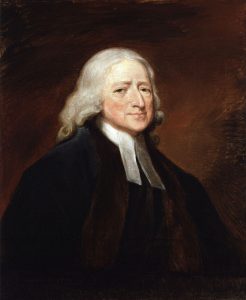
24th May is celebrated by Methodists as Aldersgate Day. It is the date in 1738 John Wesley described his heart as being “strangely warmed” when, reluctantly attending a meeting, he listened to Luther’s Preface to the Epistle to the Romans being read out. He recorded that “I felt I did trust in Christ, Christ alone for salvation, and an assurance was given me that he had taken away my sins, even mine and saved me from the law of sin and death”
Of course, this is not the start of the story. I can recall when I was younger this event was sometimes described as the ‘birth’ of Methodism – but it wasn’t even that, Methodists already existed!
In 1738 John Wesley had been ordained for around 10 years and the days of the Oxford Holy Club where the term Methodist was first used were also many years before. At Oxford, John, Charles (his brother) and several others, including later George Whitfield, would meet together to study classics, read and study scripture, pray, fast, attend communion, serve the poor, visit the ill and imprisoned. They sought to take their faith seriously and to do so regularly and with method.
In the years before Aldersgate John and Charles had been to America as missionaries, with the intention of
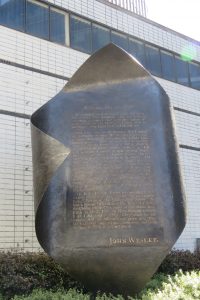
“converting the Indian” but during a period of deep heart-searching, John wrote “I went to America, to convert the Indians; but oh! who shall convert me?”. The trip was not a success, and John finally had to flee the continent. On the journey out, he had met with some Moravians and had been impressed by their faith. While a storm raged, he along with most other passengers had been in fear for their lives, but the Moravians were calm, saying when asked that they were not afraid to die. Later John met with a Moravian Bishop, Spangenberg, who asked him “Have you the witness within yourself? Does the Spirit of God bear witness with your spirit that you are a child of God?” These questions rather shocked the quite High Church Wesley but remained with him.
After his return home, Wesley spent the next four months preaching in various churches and had many meetings with Peter Boehler, another leading Moravian, as did his brother Charles. Boehler encouraged him to continue preaching when John felt that due to a lack of faith he should stop: “I was, on Sunday, the fifth, clearly convinced of unbelief, of the want of that faith whereby alone we are saved. Immediately it struck into my mind, “Leave off preaching. How can you preach to others, who have not faith yourself?” I asked Bohler whether he thought I should leave it off or not. He answered, “By no means.” I asked, “But what can I preach?” He said, “Preach faith till you have it; and then, because you have it, you will preach faith.” Wesley did just that, recording in his journal the texts he preached from and the results, which seem to have been mainly churches saying he could not preach there again.
This is the background to the Aldersgate experience.
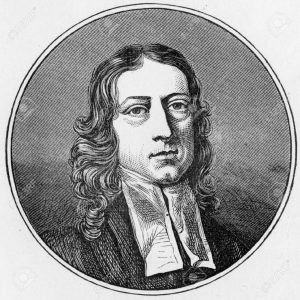
It is often thought of as Wesley’s “conversion” experience, but it is not an evangelical conversion as is usually understood today, or since the days of the later revivalist preachers, when conversion became a matter of understanding the gospel and saying, with meaning ‘the sinner’s prayer’, an instant response that could be counted and proved with statistics showing decision cards with boxes ticked. Before Aldersgate John Wesley had spent years wrestling with faith. He understood his need for salvation, he knew about and did repent, he devoted his life already above and beyond most people to serving God and had been earnest seeking to do so since childhood, but this was not seeking salvation by works as he understood about salvation by faith alone.
So, was John Wesley a Christian before Aldersgate?
In evangelical churches we often talk about faith as a personal relationship with God, we teach about how repentance and belief are not merely intellectual assent to a set creedal statements but something that will affect every part of our lives – but then we set an entry point to this life of ‘being born again’ as a one-off gateway experience. Being born again is usually taught as repentance, belief, and a prayer that combines those with a commitment to follow Christ for life, often called ‘the sinner’s prayer’. It is also normally presented as a straightforward before and after moment in time and hope the proverbial bus doesn’t hit you until after.
However, for many brought up in churches, encouraged in faith and belief since childhood, this is a poor way of explaining and deepening their experience. What most will testify to is a time when their faith became personal, when it became more than the prayers they prayed with parents, in church or in Sunday School; a time when they began to know their own hearts and minds and to make their own choices about faith. Many have already prayed the prayer and been baptised by this point, because of course they will stick up their hands, shout and dance because they love Jesus and want to follow him – they always have. They have always believed, always repented, always loved and followed and worshipped.
Their need is not to respond to a gospel message, their need is to make it personal, not just ‘of course’.
I think that was so with John Wesley as well.
I have no doubt that he was ‘saved’ before Aldersgate, but at the time he had many doubts of it himself. Aldersgate was an assurance of forgiveness, of salvation. It was when the faith of his intellect, the faith of his understanding, the faith of his choice, the faith of his seeking, the faith he had always had, became the faith of his heart.
Aldersgate fire was not conversion. Wesley’s faith was kindled, his heart was strangely warmed, he was assured of God’s grace and forgiveness. This was when he found the personal aspect, when with that assurance he was able to spend the rest of his life travelling the length and breadth of the country to preach salvation to as many as possible. Reading his journal is a breathtaking ride up and down from Cornwall to the Highlands, via Bristol, Nottingham, London, Carlisle, up and down, again and again, preaching several times a day well into his eighties. Aldersgate was not a born-again conversion experience, but it gave him assurance that led to his preaching of faith for another 60 years. He preached till he found faith, and then because he had it.
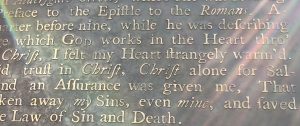
Maybe we are selling Christianity short when we preach a conversion story, when being born again is the end of a story, after the exciting bit. It should be the other way around. Once faith becomes real, then the adventure should be starting, not finishing.
Those raised in faith don’t always need a conversion experience, although they are pushed towards one. They need an Aldersgate, an encounter with God that gives them assurance they are known and forgiven.
Quotes from Wesley’s Journal taken from: http://www.ntslibrary.com/PDF%20Books/Wesley_Journal.pdf

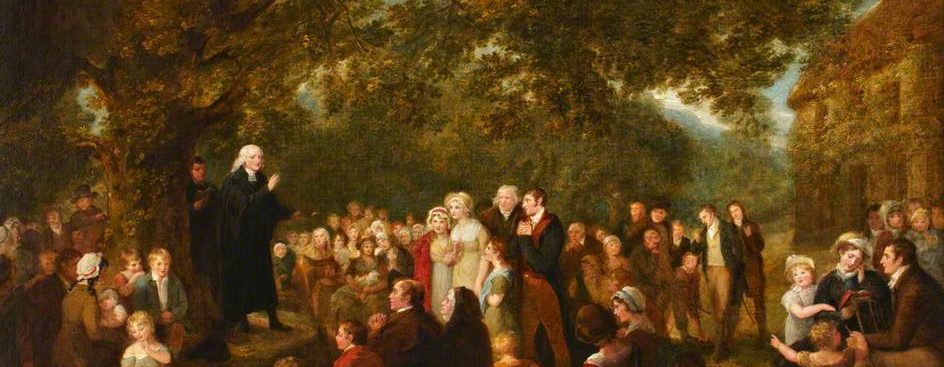
So well thought through and explained as always, Carolyn. I believe I had an experience of this nature though I do have a day when I considered myself to have been ‘born again’. However I had a faith before this time, I believed the stories in the Bible were true and that Jesus had really existed I just had no personal knowledge of Him as my Saviour. But I also believe God was watching over me during that period, keeping me from harm. God’s ways are not our ways and His thoughts are not our thoughts. He is the One who has a plan for Our lives, if we would but follow it.
Don’t stop writing your blogs, they’re worth reading.
Thank you for your encouragement Sian. I think I would say similar myself. There was a day I can point to when I heard preaching about needing to make a response, to ‘pray the prayer’ as it were, and my thought as a child, was ooh, I’d better do that – so when I said my prayers at bedtime I did. However, that was just one point on a journey and I believed before then and was even being teased at school for believing so I must have been saying things about it. I would claim in some ways to have been a Christian all my life – but that remark is too shocking to many evangelicals.